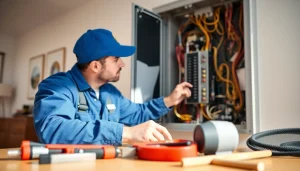Electrical Panel Clearwater: When to Upgrade and Essential Maintenance Tips
Understanding Electrical Panels
The electrical panel, often referred to as the circuit breaker panel or fuse box, serves as the heart of any electrical system within a home or business. It’s responsible for distributing energy coming into the building to various circuits, ensuring a steady and safe flow of electricity. Understanding the functionality and components of electrical panels is crucial for homeowners in Clearwater, especially regarding maintenance and upgrades. For further insights on how to identify when an upgrade is essential, you can refer to our detailed guide on Electrical Panel Clearwater.
What is an Electrical Panel?
An electrical panel is a metal box designed to manage and distribute electrical power within a property. It connects the building to the public power supply while offering circuit protection and efficient power management through circuit breakers or fuses. By dividing electrical flow into different circuits, an electrical panel prevents overload and creates safety protocols to ensure that when an issue occurs, it can be contained without damaging the overall system.
Components of an Electrical Panel
A typical electrical panel consists of several key components, including:
- Main Circuit Breaker: This is the switch that controls the power flow to the entire house. It can be turned off for safety during major electrical work or emergencies.
- Individual Circuit Breakers: These protect specific circuits within the home. Each breaker can be reset if it trips, isolating the problem without affecting the entire system.
- Bus Bars: These are metal strips that provide the connection to the circuit breakers, allowing electricity to flow from the service line to the breakers and thus to the circuits.
- Grounding Bar: This component connects to the ground, providing a pathway to divert excess electricity safely into the earth, which helps in preventing electrical shocks.
- Panel Door: Typically marked with safety labels, the door should remain closed to prevent unauthorized or accidental access, maintaining its integrity.
Common Electrical Panel Types in Clearwater
When considering upgrades or replacements, it’s important to understand the different types of electrical panels commonly used in Clearwater:
- Fuse Boxes: Older homes may still have fuse boxes instead of circuit breaker panels. A fuse box uses fuses to protect circuits but is less efficient and safe than modern panels.
- Sub Panels: Used as an extension of the main electrical panel, sub panels can provide power to specific areas, such as garages or basements, reducing the load on the main panel.
- Circuit Breaker Panels: The most common type of electrical panel today, circuit breaker panels are equipped with breakers that shut off the electrical flow when problems arise, ensuring safety.
Signs Your Electrical Panel Needs an Upgrade
Upgrading an electrical panel is a significant investment, but it’s essential for safety and efficiency. Homeowners in Clearwater should be vigilant for several signs that indicate it may be time for an upgrade.
Frequent Tripping of Breakers
One of the most common indicators of a panel in need of an upgrade is frequent tripping of breakers. If you find yourself resetting circuit breakers every few days or weeks, this signals that your panel may be overloaded and unable to handle the electrical demand of your household. Regular tripping can pose a fire risk and damage appliances. It’s advisable to consult a licensed electrician before experiencing ongoing power disruptions.
Age of Your Electrical Panel
Another key indicator is the age of your electrical panel. Most panels last between 20 to 30 years. If your panel is approaching or has surpassed this lifespan, consider upgrading it to enhance safety and efficiency. Older panels, particularly those made by certain manufacturers, are known to be less reliable and could potentially fail.
Increased Power Demand in Your Home
With the rise of technology and home automation, many homeowners are adding devices that require significant power—like EV chargers, high-capacity refrigerators, and sophisticated heating and cooling systems. If you’re routinely using numerous electronic devices, appliances, or systems, your existing electrical panel may not suffice and will likely need an upgrade to manage this increased power demand effectively.
Benefits of Upgrading Your Electrical Panel
The decision to upgrade your electrical panel comes with numerous benefits that extend beyond just overcoming current issues. Here are the key advantages to consider:
Improved Safety Standards
One of the most critical reasons for upgrading your electrical panel is improving safety standards. Newer panels incorporate advanced features that provide enhanced protection against electrical faults, including ground fault circuit interrupters (GFCIs) and arc fault circuit interrupters (AFCIs). These features help prevent electrical shocks and reduce risks associated with electrical fires. By upgrading to a safer panel, Clearwater homeowners can protect their families and belongings.
Enhanced Energy Efficiency
Modern electrical panels are designed to be more energy-efficient than their older counterparts. They better manage energy use, reducing the overall cost of electricity bills. With an upgraded electrical panel, homeowners may experience optimized performance of appliances and systems, leading to not only savings but also a reduced carbon footprint. Additionally, energy-efficient panels work more reliably, which can extend the lifespans of connected devices.
Increased Home Value and Appeal
Investing in an upgraded electrical panel can also significantly increase the value of your home. Prospective buyers often look for modern electrical systems as part of the overall appeal of a property. An updated panel assures them that the house meets current safety codes and can handle modern electrical demands. Thus, if you’re considering selling, having a new panel can be a strong selling point that makes your property competitive in the Clearwater real estate market.
Choosing the Right Electrician in Clearwater
Once you’ve established the need for an electrical panel upgrade, the next step is to choose the right electrician for the job. This decision is pivotal to ensure the work is performed safely and to code. Here’s how to identify qualified professionals:
Qualifications and Certifications to Look For
Before hiring an electrician, confirm their qualifications and certifications. Licensed electricians must have undergone extensive training and have the necessary permits to carry out electrical work legally. Look for certifications from recognized bodies, such as the National Electrical Contractors Association (NECA) or the Independent Electrical Contractors (IEC), which indicate a commitment to industry standards.
Finding Local Experts for Panel Upgrades
Finding local experts can be beneficial, as they are likely familiar with the specific codes and regulations in Clearwater. Local electricians can provide personalized service, rapid response times for emergencies, and a better understanding of regional electrical needs. Seek recommendations from friends, family, or online review platforms to ensure you find reputable electricians in your area.
Requesting Free Estimates and Reviews
When considering various electricians, always request free estimates before making a decision. A trustworthy electrician will provide a clear breakdown of costs involved, including labor, materials, and any potential additional fees. Additionally, don’t shy away from reading online reviews from previous customers. This feedback can provide insights into their quality of service, reliability, and overall customer satisfaction.
Frequently Asked Questions about Electrical Panels
How Much Does an Upgrade Cost?
The cost of upgrading an electrical panel varies significantly based on several factors, including the size of the panel, the complexity of the installation, and labor rates in Clearwater. On average, homeowners can expect to pay between $800 and $3,000. It’s important to obtain estimates from several licensed electricians to ensure a competitive and fair price for your necessary upgrades.
How Long Does the Installation Take?
The installation of a new electrical panel generally takes between 4 to 8 hours, depending on the complexity of the upgrade and the condition of the current electrical system. In some cases, if additional wiring or permits are required, the process may take longer. Electricians will typically provide an estimated timeline after evaluating the current setup to give homeowners realistic expectations.
What Permits Are Required for Upgrades?
Upgrading an electrical panel typically requires the homeowner to obtain permits from local government agencies to ensure compliance with safety codes and regulations. The specific permits needed can vary; therefore, it’s essential to discuss this with your licensed electrician. They can help navigate the permit process, ensuring that all work is legally compliant and inspected properly, which further adds to the safety and efficiency of the electrical upgrade.



